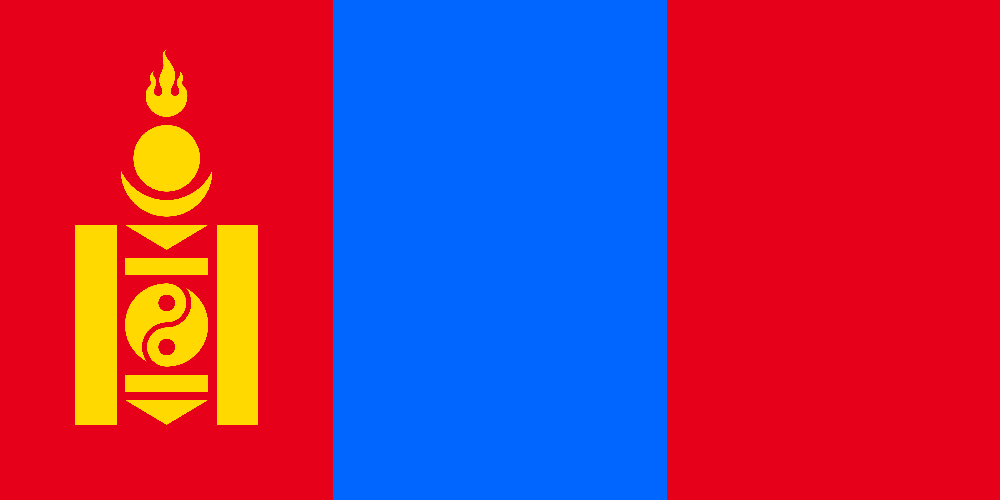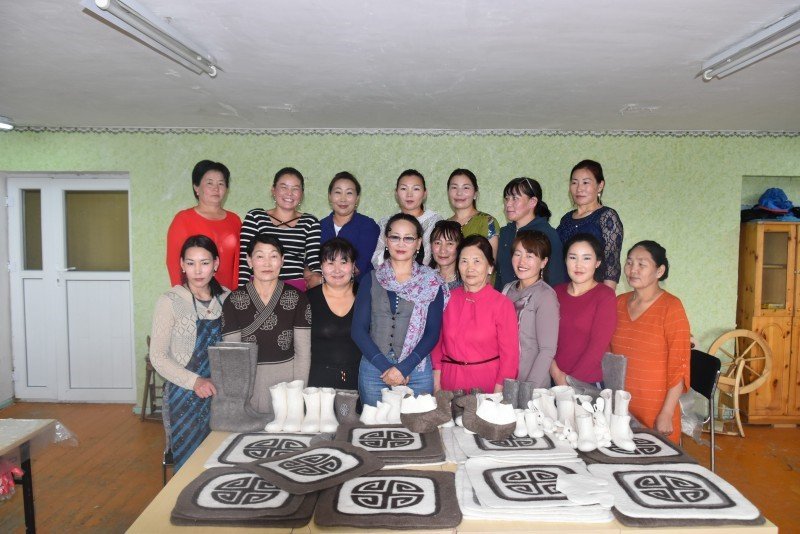
The "Green Gold and Livestock Health" project and the Mongolian National Federation of Pasture User Groups (MNFPUG), in cooperation with Khangain Sor LLC, carried out a week-long vocational training program for handmade yak and sheep wool products in Arvaikheer soum, Uvurkhangai aimag. 15 women, selected from herder communities in the soums of Arkhangai, Uvurkhangai, Bayankhongor and Khuvsgul, attended the training.
Products of Khangain Sor LLC are currently in high demand, in both domestic and foreign markets. Unfortunately, the company has reached its full capacity and cannot currently meet market demands. This shows rural areas need a better-educated and trained workforce to help meet the demand for these products.
Women attending this training learned to make felt from yak wool. In addition, they learned how to meet the high production standards of Khangain Sor LLC. This means they are now able to become suppliers of the company, thus opening up new avenues of income and self-development for themselves.

"Prior to the training, participants had no yak and sheep wool processing skills,” Director Bolormaa explains. “As a result of the vocational training, they now possess basic practical and theoretical knowledge about raw wool processing, wool combing and wool washing. They are now capable of producing end-user products while taking care of their own family’s needs. For example, participants are now able to turn industrial or scrap raw materials into socks, boots, rugs and souvenirs. They have learned all necessary skills for rug-making, including creating patterns, tailoring and patching. With these basic skills they can produce virtually any product they might imagine. Nomadic herders can save yak and sheep wool in the summer while on the move, and process and produce products in the winter, while they are sedentary. Our company’s products are in demand, both domestically and abroad. However, even when utilizing all of our resources, we cannot meet our demands and orders. If local people learn to make product parts and supplies, and produce them locally, these herder women can become household producers and increase their income. For this reason, I want to see every household to become a producer."
In order to equip more herdswomen with this vocational training, a tripartite contract has been drawn up between MNFPUG, Khangain Sor LLC, and the attendants. The contract sets forth certain terms, including that the attendee must train and pass on her new skills to at least two other herdswomen when she returns to her rural area. In addition, she must participate in product exhibitions in the aimags of Arkhangai, Uvurkhangai and Bayankhongor, in order to advertise her products to tourists.
Sh. Batjargal, resident of Khuvsgul Aimag:
“Five of us have come from the Arbulag, Ulaan-Uul, Alag-Erdene and Tunel soums of Khuvsgul. During the vocational training, we learned wool combing, rug making, and two types of technology to use in felt socks, felt boots and felt souvenirs. Previously, we knew about felt products but had no idea how to make them. Most importantly, at this training we learned to craft professionally-made products without using needles and patches. When we go back to our areas we will teach other women, and together we will produce souvenirs and sell them. Previously, we used to buy Chinese-made felt in order to produce socks and boots for our children. Now I can make my own raw felt. One big outcome of this vocational training is that it helped me see the possibilities we have as women. By organizing ourselves into a small-sized workshop or felt training center, we could improve our skills and make new products.”
M. Shirmentogoo, resident of Jinst soum of Bayankhongor Aimag:
“I am glad, because at this vocational training I learned not just how to produce everyday items, but also able how to become a part of the workforce for Khangain Sor LLC by producing felt and felt products. By acquiring a wool-combing machine to share among our soum’s herders, we herdswomen can improve ourselves, increase our income, and make higher profits from yak and sheep wool that otherwise would not fetch high market prices.”
Published: 2017-10-27 06:31:54






